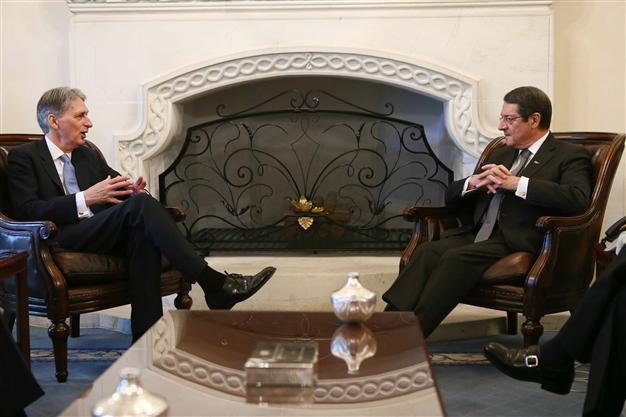Britain offers Cyprus land in event of peace deal
NICOSIA – Agence France-Presse

A handout picture released by the Greek Cypriot government's Press and Information Office (PIO) on July 17 shows Greek Cyprus' President Nicos Anastasiades (R) meeting with British Foreign Secretary Philip Hammond at the presidential palace in Nicosia.
Britain is ready to offer a reunified Cyprus large swathes of British bases territory on the island in the event of a peace deal, Foreign Secretary Philip Hammond said July 18.
"We have made clear that in the context of a settlement, Britain is willing to offer to surrender a significant proportion of the land surface of the bases to the Republic of Cyprus to allow development," Hammond told reporters after meeting his Greek Cypriot counterpart Ioannis Kasoulides.
"That offer remains on the table, and we hope that it will add to the economic benefits of a settlement being concluded and help to stimulate economic growth in Cyprus in the future," he added.
Britain retains two strategically important military bases on Greek Cyprus which remained sovereign territory after the country's independence in 1960.
As part of a 2004 U.N. peace deal, London offered to cede around 50 percent of non-military bases land in the south, but Greek Cypriots in a referendum rejected the settlement blueprint.
Britain confirmed the offer still stands in the event of a peace accord being reached.
Long-stalled U.N.-brokered peace talks were launched on May 15.
Britain launched bombing operations against the Islamic State of Iraq and the Levant (ISIL) group in Iraq in September 2014 from its RAF Akrotiri air base on the south coast near Limassol.
Cyprus has no better chance than now to strike a U.N.-brokered peace deal, European Commission President Jean-Claude Juncker told the Greek Cypriot parliament on July 17.
"You have to do it now, immediately, because this is an enormous window of opportunity and you have to do it, all together, and you will not have to do it alone," Juncker said.
"The European Union will follow this process day by day and if it is done, the money will be there. I am not promising money, I am describing the future of this great nation," he added.
Juncker called the current negotiations a "crucial moment for Cyprus history."
Greek Cypriot leader Nicos Anastasiades and Turkish Cypriot leader Mustafa Akıncı are engaged in talks seen as the best chance in years to reunify Cyprus.
"I believe that they can solve the Cyprus problem," Juncker said.
"These are the only men who will be able to do now what should have been done in the past. Don't believe that those who are coming after our generation will be able to do it," he added.
Juncker, from Luxembourg, said Cyprus should not let a painful past decide its future and spoke from personal experience of a war-torn Europe.
"Germany invaded Luxembourg twice in a century. I lost members of my family in concentration camps," he said.
"My father, one of 12 children, was incorporated by force, together with three of his brothers, into the German Wehrmacht. They had to fight, in a hated uniform, against those who were trying to liberate my country."
If Europe could make peace after such tragedies, "why should it not it be possible to do the same here?" Juncker asked.
